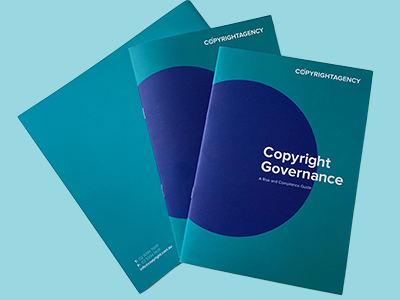
Article by: Greg Taylor and Virginia Morrison, Copyright Agency
Some recent Federal Court decisions have highlighted the importance of copyright compliance and the potential expense of not putting proper licences in place for the use of content. SPC1, Air France2 and Clive Palmer3 were each found to have infringed copyright – in software in SPC’s case and in music in the latter two cases – by using content without the copyright owner’s permission. SPC and Clive Palmer were ordered to pay substantial damages, as well as penalty amounts for flagrant conduct, and damages are yet to be determined for Air France.
Under the Copyright Act 1968 (Cth) the reproduction and communication of a copyright work requires permission from the rightsholder unless an exception applies, otherwise a person or organisation may find themselves infringing copyright.4 There are many reasons why people and organisations fail to obtain permission– ranging from ignorance to flagrancy. What they may not realise is that ignorance is not a defence to copyright infringement, and flagrancy can result in additional damages in copyright infringement cases. Most copyright infringement claims are settled out of court and subject to deeds of release that prevent the disclosure of terms, so there is not much publicity that highlights the extent of the problem.
Common copyright myths and a lack of understanding can trip up staff who use copyright material in their workflows. Let’s start by clearing up a few of these misconceptions:
We already pay for access to the content we need so we can do what we like with it. Purchasing access to something does not mean that you have purchased the rights to reproduce or communicate the material.
Our media monitoring agreements cover us for copyright. Media monitoring agreements with Copyright Agency licensed media monitors do provide for some internal sharing of media content amongst staff, and for articles to be retained for 12 months. But any other uses, including ongoing digital storage and use in internal documents, need to be licensed separately. Further some key publications are not covered by this arrangement and copies by provided by other parties such PR agencies or other organisations transfer no rights to save, share or use.
Copyright does not apply if we are only using a copy for internal purposes: There is no distinction under the Copyright Act 1968 (Cth) between a copy being made and shared with colleagues within an organisation as opposed to an external party. Communication of a work to the public requires permission – and Australian case law indicates a group of employees is likely to constitute the “public”5.
And finally, the biggest misconception, that Copyright is too restrictive and it is too hard to get permission: Copyright is valuable intellectual property – it is protected and respected by the law to foster innovation. Publishers and rightsholders set the terms on which people and organisations can reproduce and communicate their works and recognise that the requirement to get permission needs to be easy and fair. There are a range of licensing options available to users –from obtaining separate permissions from individual publishers for each reproduction and communication, to obtaining a more cost-effective, and efficient ‘collective Copyright Licence’.
What is collective licensing? Collective licensing is designed to enable organisations to obtain a consistent set of reproduction, communication and digital storage rights for multiple works under a single licence. Rights are granted to a Collective Management Organisation (CMO)6, which is ‘a national organisation licensed to handle certain types of permissions on behalf of publishers or other rights owners. CMOs can provide you with permission in the form of a license to make copies of material in several formats such as printing, photocopying, scanning, digital copying, and electronic storage.’7
These licences cover off internal use and storage of published content, together with workflow requirements where works may need to be shared externally, such as in regulatory communications or in fulfilling medical information requests.
Copyright Agency is the Australian CMO for text/image works, and has over 40 years’ experience with collective licensing. While nearly all large multinational healthcare companies have a copyright licence in place, it concerning to both publishers and Copyright Agency that many organisations continue to operate in Australia without such a licence.
If your organisation does not hold a collective licence or you are unsure if they do, we invite you to consult with Copyright Agency. We can provide information on where a licence is required and a cost-effective collective licence covering most publications from around the world that will help make your workflow copyright compliant.
Start the conversation on becoming copyright compliant by downloading the Copyright Risk and Compliance Guide from our website, or contacting one of our Senior Licensing Consultants at licence.enquries@copyright.com.au.
As a partner of ACC Australia Copyright Agency will also deliver a series of copyright webinars, with the first scheduled in May as part of the In-house Counsel Month. Delegates to the 2022 ACC Australia National Conference and Awards will have the opportunity to learn more about copyright and its application in the legal profession. Information is also available on ACC Australia’s website for all members here.
As part of the partnership, ACC Australia members’ organisations will be entitled to a 10% discount on any new copyright licences.
1QAD Inc v Shepparton Partners Collective Operations Pty Ltd [2021] FCA 615
2Boomerang Investments Pty Ltd v Padgett (Liability) [2020] FCA 535
3Universal Music Publishing Pty Ltd v Palmer (No 2) [2021] FCA 434
4Copyright Act 1968 (Cth), s36 (1) https://www.legislation.gov.au/Details/C2021C00044
5Telstra v APRA (1997) 191 CLR 140 and Australasian Performing Right Association Ltd v Commonwealth Bank of Australia [1992] FCA 930
6Also referred to as Reproduction Rights Organisation (RRO)
7See “Can I obtain permission from a Reproduction Rights Organization (RRO)”: https://www.elsevier.com/about/policies/copyright/permissions#
